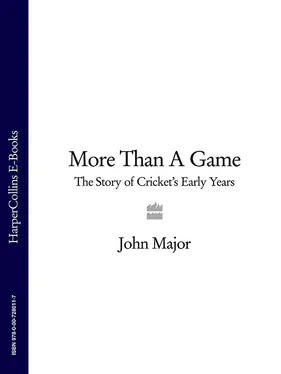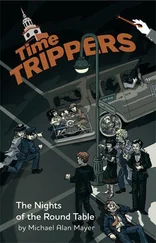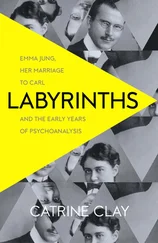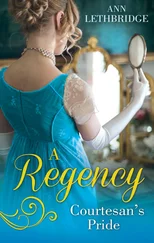This is a classic illustration of the power of cricket. It can uplift whole communities – whole nations even – or cast them down. And because cricket is played largely in the mind, and reflects the society from which the cricketers spring, it can imprint the character of that nation indelibly upon the minds of those who watch the way in which a national team plays.
When not at The Oval, I spent hour upon hour defending a Brixton lamp-post against the bowling of any passer-by. Only my half-brother Tom and our mutual friend Butch were regulars, and only bad light, in the form of nightfall, stopped play. In 1966 my love of playing the game reached a premature end when a car accident in northern Nigeria left me with a leg so shattered it was almost lost; but that did not mean I would never again pick up a bat.
As Prime Minister, in 1991 I attended a meeting of Commonwealth Heads of Government in Harare and opened the batting in a charity match with the Australian Prime Minister, Bob Hawke. The previous evening Bob had entertained his fellow heads of government with a selection of Australian and trades union songs, most of them unrepeatable, as we shared more beers than was wise. The following morning, since I had not held a bat for years, I had a net before the game. As I looked around the lovely Wanderers ground, I was flattered to see that it was filling with spectators, although my Press Secretary Gus O’Donnell, never one to let hubris pass unchallenged, did wonder aloud whether they might have come to see their local hero Graeme Hick, who was due to bat at number three.
Bob Hawke and I opened to gentle bowling, and began to settle down, with Bob stealing the bowling towards the end of each over. I didn’t mind: it was a joy just to be there. We tapped the ball here and there, and ran our singles. After a few overs the wisdom of the Hawke strategy was revealed: ‘Off you go,’ said the umpire, waving us off the pitch as he added, rather pointedly, ‘It’s time for the real cricketers.’ A roar of applause greeted our departure.
Hawke had scored over 20, while I had less than 10. ‘Did you know we didn’t have long?’ I asked him as we trudged back to the pavilion. ‘Jeez, yes,’ he admitted, a Cheshire-cat-sized grin splitting his craggy features. ‘Didn’t you know, John? Arrh, heck – I thought you did.’ Not for the first or the last time, I noted that Australians play hard.
Our host in Zimbabwe was the President, Robert Mugabe, in the years before he encouraged militants to force out white farmers and steal their property. In 1991, Mugabe talked to me fondly of cricket. ‘It civilises people and creates gentlemen. I want everyone to play cricket in Zimbabwe. I want ours to be a nation of gentlemen!’ From beyond the grave, Lord Hawke would have approved, though he, like me, would have regarded land theft as most definitely ‘not cricket’. Hawke would have disapproved too of the mismatch between Mugabe’s sentiments and the outcome of his policies: his government all but destroyed Zimbabwean cricket.
Forty years after I first visited The Oval, I came to know the Surrey club from the inside. During my years in government The Oval was a sanctuary where cares were put aside. Upon the morrow of defeat in the 1997 general election I bade my farewells to Downing Street and the Queen and headed to The Oval for a leisurely lunch and a soothing afternoon of cricket. Nor did the balm fail me: ‘You had a rough decision, mate,’ called out a gnarled regular, before turning to more important matters. ‘This boy is a good bat.’ Indeed he was: it was a young Combined Universities batsman, Will House, later of Sussex, who played a fine cameo innings. Since leaving office I have been able to step back into the pleasures of cricket as if it had never been interrupted by the rude reality of politics.
No one has ever had a sufficient gift of tongues to do justice to the charm of cricket. In fact we cannot even be sure how – or when – the game began. Folklore tells us that generations now gone would pause as they passed some insignificant village game, simply to see how the next ball fared, and then, uplifted and enlightened, pass on their way. Observation tells us that people do so still. So we know the fascination of cricket from its birth. We know, too, its historic moments and its famous players. But how did cricket come to be built into the warp and weft of the English language? How did it develop into the favourite pastime of a large part of the English- speaking world? Why – in all sport – does cricket possess a literature that no other can match? Why do grown men babble of games they never saw and cricketers who died a hundred years before?
A wet day makes a conversationalist of the most taciturn cricket- lover. One rain-drenched hour at The Oval was filled with a discussion about Don Bradman’s last Test innings, when the great man was bowled second ball by Eric Hollies for a duck in the final Test of the 1948 series. It is a story every cricket-lover knows, and, cheated of cricket, we were debating at which end the Don was batting. Someone turned to Arthur Morris, the former Australian Test batsman, who was listening silently as he sipped a glass of red wine. ‘Surely, you must know, Arthur? Were you in that team?’ asked an ignoramus. Raman Subba Row, the former England batsman, who knows his history, choked. ‘Yes,’ said Arthur, sipping placidly. ‘I was at the other end when Don was out. I scored 196.’
There is a postscript to this story. As Bradman returned to the pavilion he was stopped in the Long Room by Field Marshal Montgomery, once captain of cricket at St Paul’s school, who had famously encouraged his troops to ‘hit Rommel for six’. Montgomery barked at him, ‘Sit down, Bradman, and I will tell you where you went wrong.’ The absurdity of anyone telling the most prolific run-getter of all time how to bat apparently escaped the old soldier. Bradman revealed this vignette in a letter to the Surrey Club many years later; he did not mention whether he had taken the opportunity to criticise the Field Marshal’s battle plan at El Alamein, but probably he did not. This was wise, as Montgomery was never plagued by self-doubt. A man who can say, ‘As God said – and, on the whole, he was right …’ is not a man to be crossed. Bradman was prudent to keep his own counsel. Moreover, he was courteous even when a sharp response was justified.
I discovered this for myself that same rainy day at The Oval. I had never met Bradman, but I did occasionally speak to him on the telephone. As we debated his last innings during one of the showers, Raman remembered it was the Don’s birthday, and someone suggested I phone him with our congratulations. I did so. As we spoke, I described the day’s cricket and the wretched weather. ‘How is it in Australia?’ I asked. ‘Dunno,’ came the reply. ‘It’s two o’clock in the morning here.’
Sir Donald Bradman is from the aristocracy of cricket. He is one of the rare breed of cricketing knights, all of whom are from the upper class of talent. But the honours system is haphazard, ultimately at the whim of subjective judgements and sometimes perverse. In the more class-conscious Victorian age, even W.G. was overlooked. As Prime Minister, I wished to put right some injustices. I could not simply award honours, but I could nominate for the appropriate independent scrutiny committee to adjudicate. *My first nomination for consideration was Harold Larwood, one of England’s greatest fast bowlers, who had been disgracefully treated by the cricketing establishment after the notorious ‘bodyline’ series against Australia in 1932–33. He had been driven out of Test cricket for obeying his captain’s instructions.
The Scrutiny Committee were startled at a nomination for a cricketer who had ceased playing nearly sixty years earlier, and I daresay sucked their teeth before deciding to award Larwood an MBE – below tariff, I thought, but welcome nevertheless. I had a further small list of names, but thought it proper to proceed cautiously, a decision I came to regret, for the Grim Reaper struck before I did, and my other nominations came too late.
Читать дальше












